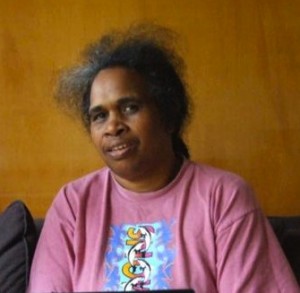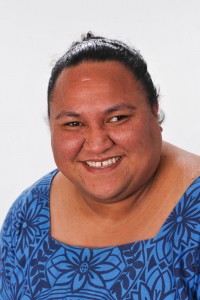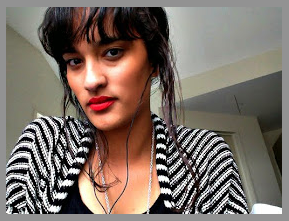Graduating this week
 Congratulations to Lois Kusilifu (Solomon Islands) who is graduating this week with a Master of Indigenous Studies degree.
Congratulations to Lois Kusilifu (Solomon Islands) who is graduating this week with a Master of Indigenous Studies degree.
Title: The Experiences of the Solomon Islands Seasonal Workers under the Recognised Seasonal Employer scheme in New Zealand
Supervisor: Dr.Alumita Durutalo
Abstract: “Oketa chalens na osem, pipol lo dea oketa laef stael differen, espeseli na swea. Ani smol samting swea.Iumi wea garem kastom,kaen ia barava nogud lo iumi. Sapos iu no doim eniting gud oketa swea lo iu nao, so hem na osem mi faesim. Hem nogud tumas lo mi taem mi herem oketa usim nem blo God mi fil nogud tumas. Nara samting moa,mifala waka anda nit presa. Mifala bae no rest, taem,taem, everiting mas in taem. Osem gogo mifala big woman gogo osem smol pikinini tu becos mifala waka anda presa. Ma samting mi saenem na ia. Osem sapos oketa lelebet meanim wei blo iumi bae gud(9WW).”
(The challenges I have come across is that the lifestyle is different. Especially the way swearing and blasphemy are a common everyday speech. Not only that, we work under pressure. We don’t rest for long. We are expected to do things on time. This makes us feel as if we are kids. If only they understood us)
This study focuses on e focus the experiences of the Solomon Islands seasonal migrant workers in New Zealand’s Recognised Seasonal Employer (RSE) scheme. This scheme enables low-skilled seasonal migrant workers, to work temporarily in New Zealand’s horticulture and viticulture industries for a period of three to seven months each year. Interviews were conducted in two different locations- Wairarapa, New Zealand and Honiara- Solomon Islands. Qualitative research methods were used in gathering primary and secondary information. The findings of the research suggest that Solomon Islanders have benefited from participating in the scheme in ways they expressed as in building of permanent homes, advanced payment of school fees and undertaking of small businesses.
This study focused on extending the boundaries of earlier research, such as that done on Ni-Vanuatu seasonal workers in New Zealand, by having an in-depth focus on the social experiences of the Solomon Islands seasonal workers in New Zealand. What were the social experiences of the Solomon Islands seasonal workers and what could be done to improve employer and employee relations through policies to enable the benefit of all, the employers, employees and the countries involved.
Te Tumu postgraduate success
Featuring Malia Lameta & Te Ao Marama Tawhara. Six Te Tumu Masters-level students are graduating next week, with either Master of Arts, or Master of Indigenous Studies, showcasing our research strengths in the fields of Māori Studies, Pacific Island Studies, and Indigenous Development. Two are featured in today’s blog post, with more profiles forthcoming.
 Malia Ellen Mamele Lameta (Samoan)
Malia Ellen Mamele Lameta (Samoan)
MA (Pacific Island Studies) supervised by Professor Michael Reilly and Dr Michelle Schaaf.
“I Am The Apple Of My Brother’s Eye” : An investigation into the evolving roles of Samoan women with particular reference to religion and gender relations.
[Click here to access the thesis]
Abstract: What does it mean to be a Samoan woman? The following thesis addresses this question by exploring the lived experiences of Samoan women with particular reference to religion and gender relations. Adopting an inter-disciplinary approach, it sheds light on the tenacity of socio-cultural and political factors that influence women’s roles and status. In particular, this research explores how Samoan women navigate the differing and often contradicting worlds of culture, Christianity, family, education, politics and gender. Information for this research was obtained through a series of interviews and literature analysis of primary and secondary sources. It has been the aim of this thesis to prove, not only to myself, but to those with a background and understanding similar to my own, that we, as women, are not inferior within Samoan culture. The participants’ words have been integrated throughout this thesis from Chapter One so as to emphasise and give strength to the voice of Samoan women. This thesis is centred on the inspiration and aspiration of these women and as a result, their testimonies have been brought alongside the literature as opposed to being supplementary. Women’s roles as sisters, wives and daughters are explored and the question is posed whether their cultural importance and status has been diminished by the influence of Christianity. From the evolution of women’s roles, to the changing meanings of the feagaiga, from the arrival of Christianity to the present day, women within Samoan society play a role that is imperative to the proper function of families, villages, districts and nation. The arrival of Christianity has not stripped us of our traditional importance but has increased and expanded our roles. We, Samoan women, are not oppressed, we are not suppressed; we have a voice, a place and dreams.
 Te Ao Mārama Anna Maria Tawhara (Ngāi Tūhoe/German)
Te Ao Mārama Anna Maria Tawhara (Ngāi Tūhoe/German)
MA (Māori Studies) supervised by Dr Matiu Rātima & Associate Professor Poia Rewi.
Kia Māori te reo Māori? An investigation of adult learner attitudes towards the impact of English on te reo Māori
Abstract: This study sought to answer the following questions: What impact does the English language have on te reo Māori (the Māori language)? What attitudes do adult language learners have towards the impact of English on te reo? And what implications do these attitudes have for the revitalisation of te reo Māori? Engaging in in-depth semi-structured interviews with eight former University of Otago Māori language students from Te Tumu School of Māori, Pacific and Indigenous studies[1] (Te Tumu) forms a necessary part of this research project. Following Braun and Clarke (2008), the data gathered from the interviews was examined using Thematic Data Analysis.
The fundamental aim of this thesis is to explore and describe adult learner attitudes towards the impact of English on te reo Māori, so as to gain insight into how active language learners within Te Tumu perceive the influence of the English language. The thesis has two key foci, the first is parts of language, such as transliteration, code switching, pronunciation, grammar and idiom. The second is the impact of English within the context of teaching and learning.
On the one hand, this study shows that the participants view the impact of English as a form of contamination that is having a negative effect on Māori cultural concepts because there is less use of authentic Māori words and phrases, which in turn dilutes and minimises the representation and understanding of a Māori epistemological world view. On the other hand, some participants identified specific times when English language usage could be helpful to their developing proficiency in te reo Māori. The findings yield that there are certain exceptions such as the use of transliterations and code switching as being a necessary tool for scaffolding learning of te reo Māori particularly during the early stages of learning. The use of transliteration as a form of humour was also seen as acceptable. However, the main concern among the cohort was the maintenance of the authentic use of te reo Māori, more specifically, Māori lexicon, grammar, pronunciation, and idiom. Furthermore, the participants felt strongly about certain aspects of teaching and learning within Te Tumu that privilege Pākehā teaching methods[2] such as the grammar translation method and a lack of attention to tikanga Māori (Māori culture) and Māori centred pedagogies. The findings from this study show definitively that the participants feel that the language is in a state of contamination, on the other hand they are also concerned that there are times where transliteration and code switching can be necessary, even useful.
[1] See http://www.otago.ac.nz/tetumu/ for further information about the University of Otago department of Māori, Pacific and Indigenous studies.
[2] By Pākehā methods of teaching I am referring to the pedagogical teaching practices that favour the use of the English language.

